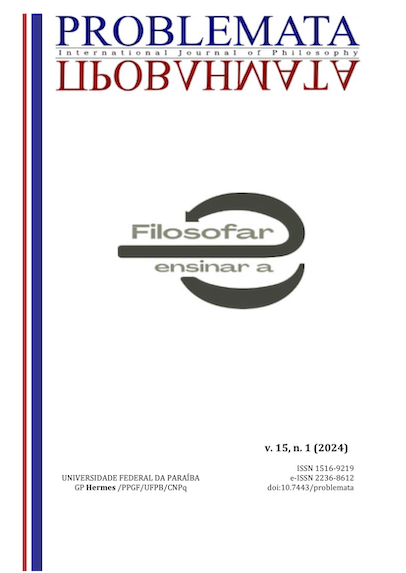THE DISCIPLINE-AGNOSTIC PROBLEM, A HYPOTHESIS OF A NEW NARRATIVE PRODUCED BY DISCONNECTION FROM PLACE
DOI:
https://doi.org/10.7443/problemata.v15i1.69319Keywords:
Chaos, Science, Culture, Science fiction, UncertaintyAbstract
The relationship between philosophy, science, and complexity is a theme explored by thinkers such as Donna Haraway, Isabelle Stengers, and Ilya Prigogine. Thus, the order of the world is perceived through uncertainty, especially from Prigogine's perspective, who views creativity through the theoretical lens of chaos, destabilizing traditional concepts and constructing a cosmology in constant evolution, where stability is a "fluctuating order." Given that understanding encompasses the dual relationship between time through the inference of reversibilities and the irreversibility of time. These characteristics make it a physical and ontological agent of existence, revealing a dynamic and evolving universe. Thus, the nonlinear system ends up destabilizing Newtonian physics thinking and requires probability as a way to understand complexity and unpredictability. Interdisciplinarity and the narrative that constructs knowledge from the junction of philosophy, science, and culture help form a fragmented and localized view of knowledge.
Downloads
References
BARAD, Karen. Meeting the Universe Halfway: quantum physics and the entanglement of matter and meaning. Durham, London: Duke University Press, 2007.
BATENSON, Gregory. Steps to na escology of mind: collected essays in anthropology psychiatry, Evolution, and epistemology. Northvale: Jason Aronson, 1972.
FOUCAULT, Michel. Arqueologia das Ciências e História dos sistemas de pensamento. 3. ed. Rio de Janeiro: Forense Universitária, 2013 (Coleção Ditos e Escritos, II).
GIBSON, William. Neuromancer. New York: Ace Science Fiction Books, 1984.
GIBSON, William, Neuromancer. Trad. May a Sanagwa e Sílvio Alexandre, eLivro de Marília, 1984.
GIL, José. A imagem-nua e as pequenas percepções: estética e metafenomenologia. Trad. Miguel Serras Pereria. Lisboa: Relógio D’ Água Editores, 1996.
GORDON, Deborah M. The Ecology of Collective Behavior. PLoS Biol. v. 12, n. 3, e1001805. doi:10.1371/journal.pbio.1001805. mar. 2014. Disponível em: https://journals.plos.org/plosbiology/article?id=10.1371/journal.pbio.1001805. Acesso em: jan. 2024.
GORDON, Deborah M. Collective wisdom of ants. Scientific American, v. 314, n. 2, p. 44-47, 2016.
GORDON, Deborah M. The evolution of the algorithms for collective behavior. Cell Systems, v. 3, n. 6, p. 514-520, 2016.
HARAWAY, Donna J. Simians, Cyborgs, and Women: The reinvention of nature. London: Free Association Books, 1991.
HARAWAY, Donna Jaenne. Staying with the trouble: Making kin in the Chthulucene. Durham: Duke University Press, 2016.
HARAWAY. Donna J. Seguir con el problema: Generar parentesto en el Chthuluceno. Tad. Helen Torres. Bilbao: Ed. Consonni, 2019.
JACOB, François. A lógica do vivente: uma história da hereditariedade. Paris: Éditions Gallimard, 1970.
JACOB, François. Le jeu des possibles: essai sur la diversité du vivant. Paris: Librairie Arthème Fayard, 1981.
JACOB, François. O jogo dos possíveis: ensaio sobre a diversidade do mundo vivo. Lisboa: Ed. Gradiva, 1981.
JACOB, François. A lógica de vida: uma história da hereditariedade. Trad. Ângela Loureiro de Souza. Rio de Janeiro: [s. n.], 1983.
JAMESON, Fredric. The political unconscious: narrative as socially symbolic act. London, New York: Routledge Classics, 1983.
KRAUSS, Rosalind. A escultura no campo ampliado. Arte & Ensaios, v. 17, n. 17, p. 128-137, 2008.
KIRKSEY, Eben; SCHUETZE, Craig; HELMREICH, Stefan. Tactics of multispecies ethnography. In: KIRKSEY, Eben (ed.). The multispecies salon. Durham: Duke University Press, 2014.
LATOUR. Bruno. Diante de Gaia: oito conferência sobre a natureza do antropoceno Bruno Latour. Trad. Maryalua Meyer. São Paulo: Ubu Editora; Rio de Janeiro: Ateliê Humanidades Editorial, 2020.
MARGULIS, Lynn. Planeta simbiótico: un nuevo punto de vista sobre la evolución. [S. l.]: Editorial Deriva, 2015.
PRIGOGINE, Ilya; STENGERS, Isabelle. Order out of chaos: man’s new dialogue with nature. New York: Bantam, 1984.
PRIGOGINE, Ilya. O fim das certezas: tempo, caos e as leis da natureza. Trad. Roberto Leal Ferreira. 2. ed. São Paulo: Editora Unesp, 2011.
STENGERS, Isabelle. Cosmopolitics I. Tras. Robert Bononno. London, Mineapolis: University of Minnesota Press, 2010.
TING, Anna Lowenhaupt. Viver nas ruínas: paisagens multiespécies no antropoceno/ Anna Lowehaupt Tsing; edição – Thiago Mota Cardoso, Rafael Victorino Devos. Trad. Thiago Motta Cardoso; Rafael Victorino Devos; Marilena Altenfelder de Arruda Campos; Vivine Vedana; Paulo Oliveira Ramos Rodrigues; Victor Vieira Paulo; Maria Alice Neves; Yves Marcel Seraphim; Beatriz Demboki Búrigo. Brasilia: IEB Mil Folhas, 2019.
VAN DOOREN, Thom; KIRKSEY, Eben; MÜNSTER, Ursula. Multispecies Studies Cultivating Arts of Attentiveness. Environmental Humanities, v. 8, n. 1, p. 1-23, 2016. Disponível em: http://read.dukeupress.edu/environmental-humanities/ article-pdf/8/1/1/408987/1vanDooren.pdf. Acesso em: jan. 2024.
VON HIPPEL. William. A evolução improvável: A nova ciência evolutiva sobre quem somos, o que nos faz felizes e por que isso é importante. Trad. Alexandre Martins. Rio de Janeiro: Harper Collins, 2019.
VIVEIROS DE CASTRO, Eduardo. Perspectivismo e multinaturalismo na América indígena. In: VIVEIROS DE CASTRO, Eduardo. A inconstância da Alma Selvagem. São Paulo: Cosac Naify, 2011, p. 347-399.
Downloads
Published
Issue
Section
License
Copyright (c) 2024 Cláudio Henrique Euripedes de Oliveira

This work is licensed under a Creative Commons Attribution 4.0 International License.
Authors who publish with this journal agree to the following terms:
- Authors retain copyright and grant the journal right of first publication with the work simultaneously licensed under a Creative Commons Attribution License that allows others to share the work with an acknowledgement of the work's authorship and initial publication in this journal.
- Authors are able to enter into separate, additional contractual arrangements for the non-exclusive distribution of the journal's published version of the work (e.g., post it to an institutional repository or publish it in a book), with an acknowledgement of its initial publication in this journal.
-
- Authors are permitted and encouraged to post their work online (e.g., in institutional repositories or on their website) prior to and during the submission process, as it can lead to productive exchanges, as well as earlier and greater citation of published work (See The Effect of Open Access).





